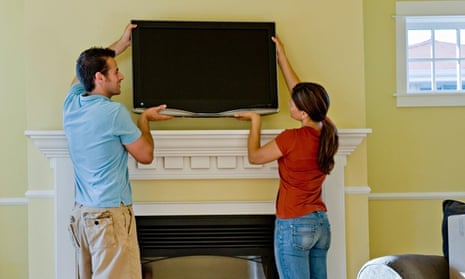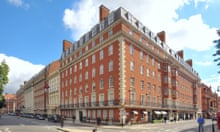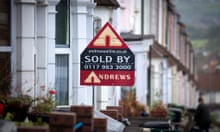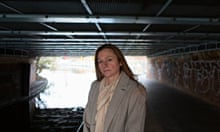The collapse in homeownership by individuals and families under 30 years old over the past decade is laid bare in an official analysis of the housing market in Britain since 1980.
The report, by the Office for National Statistics, reveals that as recently as 1991, around 65% of 25- to 34-year-olds in England who were household heads had bought their own home. But by 2012 that figure had declined to under 45%, while among 35- to 44-year-olds it was also down sharply, from almost 80% to around 65%.
Remarkably, the report shows that through the 1980s and into the 1990s one in three 16- to 24-year-olds who were household heads were able to afford to buy their own home, compared to one in 10 today.
The ONS said the number of UK first-time buyers peaked nearly three decades ago in 1986, when more than 600,000 young people climbed on to the property ladder.
But since the beginning of the millennium – at a time when buy-to-let mortgages for landlords also became freely available – the number of first-time buyers has dropped substantially, falling to just 200,000 between 2008 and 2010. There has been a small recovery since, but the numbers still remain lower than at any time before the financial crisis.
Separate data issued by the Council of Mortgage Lenders reveals that after a surge in lending during the first part of 2014, the market has cooled. Total mortgage lending in December was £16.5bn, down 1% compared to December 2013.
The ONS research indicates a major generational change in the profile of homeownership. The group most likely to own a home now are people aged 65-74, with nearly eight of 10 living in privately owned properties. In the early 1990s, home ownership was much more concentrated among younger adults in the 35-44 age range, who were more likely to own a home than their parents. Meanwhile the number of people renting in the private sector doubled between 1980 and 2012.
Behind the collapse in first-time buyers is the extraordinary rise in house prices in the period studied. The ONS said house prices have risen by an average of 6.9% a year since 1980, despite falling for seven years during this period. The biggest single rise in any one year was 25.6% in 1988, while the biggest single drop was 7.6% in 2009.
Affordability is the major constraint for first-time buyers, the ONS said, highlighting the steep rise in deposits buyers have to put down. “Another likely contributing factor to the decline in numbers of first-time buyers is the rise in the value of deposits paid to secure a mortgage,” it said.
“For first-time buyers, the average deposit as a percentage of purchase price increased by almost 10 percentage points between 1988 and 2013, standing at 22% of the price of the house. Deposits for first-time buyers peaked during the economic downturn in 2009 at 28% of the purchase price. Since 2009, deposits for first-time buyers have steadily fallen – though figures remain among the highest for the last 25 years.”
The rise in house prices and fall in homeownership is being driven by basic issues of supply and demand, the ONS said. The overall level of house building in the UK had declined since 1980, with 140,880 houses built in financial year 2013-14 – a fall of more than 44% from the 251,820 built in 1979-80.
But in what is a politically charged issue, the ONS’s conclusion is neutral. “House prices have been increasing, and first-time buyers are finding it more difficult to get on the property ladder – while home ownership among younger age groups generally has declined. If the number of households in England grows to 24.3 million in 2021 as projected, this would be equivalent to an additional 221,000 households per year. Housing is therefore likely to remain an important topic in the future.”











Comments (…)
Sign in or create your Guardian account to join the discussion